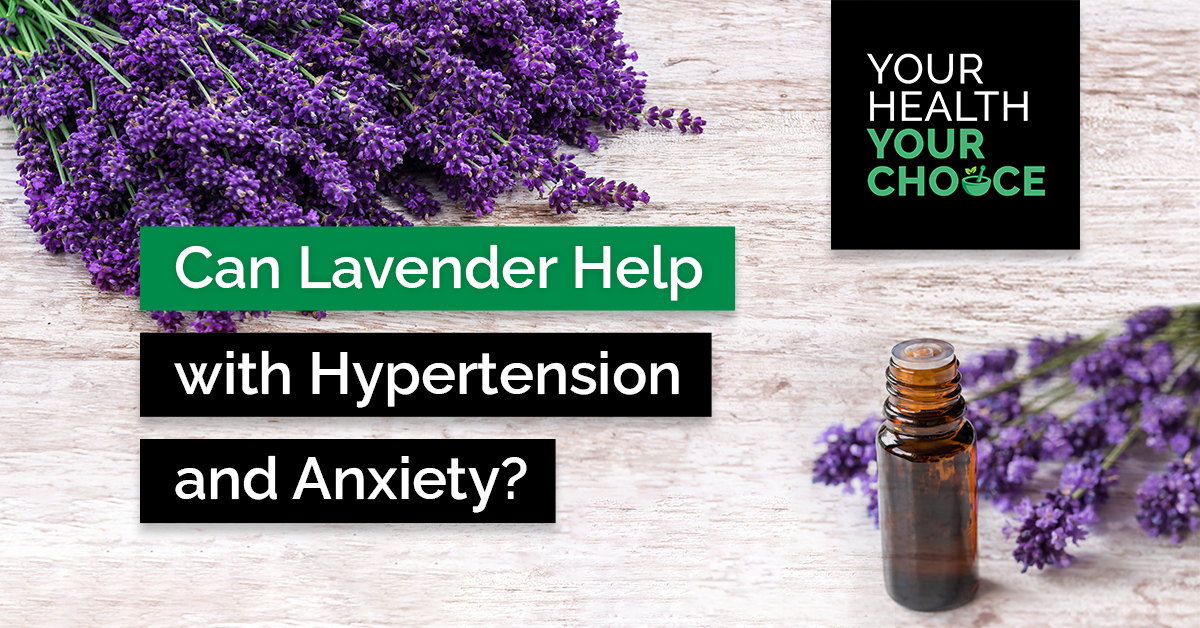Lavender for hypertension & anxiety

Almost everyone is familiar with lavender and its uplifting scent. Even just brushing against a lavender bush instantly releases its fragrance.
Lavender is a highly aromatic shrub in the mint (Lamiaceae) family, with bright purple flowers that open through the warmer months of the year. It is thought to have originated in the Mediterranean, Middle East and India. There are 30 different species of lavender and over 300 cultivars. English lavender (Lavendula angustifolia) is the most well known species.
Lavender has been associated with health and cleanliness dating back at least 2,500 years. It’s name originates from the Latin ‘lavare’ – ‘”to wash”: in Italian lavan means “wash” and lavand “laundry”. This is because since antiquity, lavender has been used as an antiseptic as well as to scent washed fabrics and as a bath perfume.
From Roman times to as recently as World War One, lavender essential oil was used to dress war wounds, prior to the advent of antibiotics. It remains a powerful topical antiseptic.
In addition to its antiseptic healing properties, lavender has also long been used to assist sleep and for reducing anxiety. Recent research is confirming lavender’s age-old use in helping people suffering from anxiety and associated disorders.
Recent study on lavender for anxiety & hypertension:
A recent study published in July 2022 has found that both inhalation and foot massage with lavender (L. angustifolia) essential oil successfully reduced blood pressure, anxiety, heart rate and serum cortisol in hypertensive patients. [1]
In terms of design, the study was a 3-arm, parallel group, randomised clinical trial that examined the effect of aromatherapy through inhalation and foot massage on blood pressure and stress response in patients with essential hypertension.
The study included 69 patients aged 18 years or older who had been diagnosed with essential hypertension (elevated blood pressure) for at least 6 months. Participants were allocated to one of three equal-sized groups:
– Inhalation group: exposed to 5 drops of undiluted lavender essential oil placed 10 cm away for 5 minutes, 3 times per week (every other day) between 7 am and 8 am
– Foot massage group: received Swedish massage using 5 drops of lavender essential oil on each foot (10 drops total) for 10 minutes on each foot (20 minutes total), 3 times per week (every other day) between 7 am and 8 am
– Control (usual-care) group: received no other therapies or interventions but visited the clinic 3 times per week (every other day) between 7 am and 8 am for measurements.
Study findings:
Blood pressure changes: Both systolic and diastolic blood pressure dropped in the foot massage and inhalation groups (slightly more in the inhalation group) over the course of three treatments, whereas the control (usual-care) group experienced an average increase in systolic and diastolic blood pressure.
Heart rate: Heart rate in the inhalation group decreased significantly compared with the control (usual-care). The inhalation group experienced a 5.08 beats/min decrease, whereas the usual-care group experienced a 3.17 beats/minute increase in heart rate.
Cortisol: Serum cortisol levels decreased over the course of the 3 treatments in the inhalation and foot-massage groups. By contrast, serum cortisol levels increased in the usual-care group.
Subjective parameters: State anxiety decreased in both the foot-massage and the inhalation groups, slightly more in the foot-massage group. In the usual-care group, there was a small decrease that was not statistically significant.
Take home message:
The study shows that lavender oil has the ability to reduce blood pressure, heart rate, serum cortisol and subjective anxiety in hypertensive patients.
This research contributes to a growing body of literature supporting the use of lavender oil inhalation and dermal application as safe, effective treatments for relieving stress and anxiety in hypertensive patients. [2]
One of the study’s limitations is that is does not clarify the best dosage or application method(s) for delivering the essential oil, which in many cases may be best determined by individual patients’ personal preferences. Further, applying the treatment daily or even several times a day (as opposed to every second day as in the trial) may have an even greater therapeutic effect.
For example, previous research has shown that inhaling lavender essential oil twice daily is more effective than inhaling it once a day to decrease anxiety in patients post-cardiac surgery. [3, 4]
The study also did not examine the benefits of combining foot-massage and inhalation at different times of day (although topical application would also involve a degree of inhalation, as the oil is highly aromatic).
What this means is that there is a fair degree of flexibility regarding how people can successfully apply lavender essential oil as a home remedy!
Sources:
[1] Can Çiçek S, Demir Ş, Yılmaz D, Açıkgöz A, Yıldız S, Yis ÖM. The Effect of Aromatherapy on Blood Pressure and Stress Responses by Inhalation and Foot Massage in Patients With Essential Hypertension: Randomized Clinical Trial. Holist Nurs Pract. 2022 Jul-Aug 01;36(4):209-222. doi: 10.1097/HNP.0000000000000526. PMID: 35708557.
[2] Donelli D, Antonelli M, Bellinazzi C, Gensini GF, Firenzuoli F. Effects of lavender on anxiety: a systematic review and meta-analysis. Phytomedicine. 2019;65:153099.
[3] Najafi Z, Taghadosi M, Khadijeh S, Farrokhian A, Tagharrobi Z. The effects of inhalation aromatherapy on anxiety in patients with myocardial infarction: a randomized clinical trial. Iran Red Crescent Med J. 2014;16(8):e15485.
[4] Bikmoradi A, Seifi Z, Poorolajal J, Araghchian M, Safiaryan R, Oshvandi K. Effect of inhalation aromatherapy with lavender essential oil on stress and vital signs in patients undergoing coronary artery bypass surgery: a single-blinded randomized clinical trial. Complement Ther Med. 2015;23(3):331-338.
« Return to News & Features
